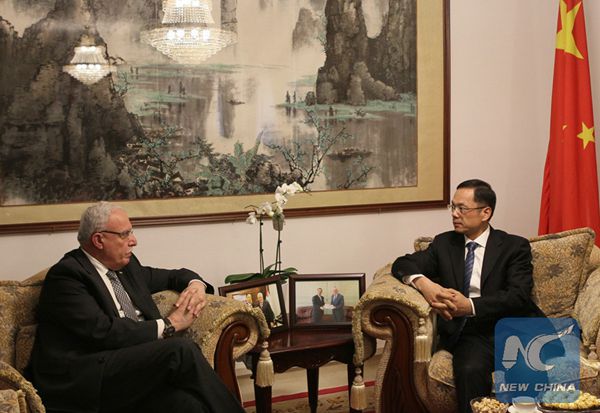China's four-point proposal on Palestinian issue embodies big power's responsibility: Envoy
The four-point proposal by Chinese President Xi Jinping to settle the Palestinian issue embodies China's responsibility as a big power on international matters, the Chinese envoy to Palestine told Xinhua in a recent interview.
|
|
|
"President Xi's four-point proposal embodies the noble concept of building a community of shared destiny for humanity, and China's responsibility as a power in firmly supporting the just cause of the Palestinian people," says Chen Xingzhong (R), director of the Office of the People's Republic of China to the State of Palestine. [Photo/Xinhua] |
Xi put forward the proposal in a meeting with Palestinian President Mahmoud Abbas during the latter's visit to Beijing in July.
"President Xi's four-point proposal embodies the noble concept of building a community of shared destiny for humanity, and China's responsibility as a power in firmly supporting the just cause of the Palestinian people," said Chen Xingzhong, director of the Office of the People's Republic of China to the State of Palestine.
In the proposal, Xi reiterated China's firm support to a political settlement of the Palestinian issue on the basis of the two-state solution, and the establishment of an independent, fully sovereign Palestinian state along the 1967 borders with East Jerusalem as its capital.
The proposal came four months ahead of the 70th anniversary of the 1947 United Nations General Assembly Resolution 181, which recommended the establishment of a Jewish state and an Arab state in the former British mandate territory of Palestine.
The Chinese leader highlighted the importance of enhancing international coordination to achieve peace between Israel and Palestine, while calling for supporting Palestine's economic development within the framework of China's Belt and Road Initiative.
Xi also offered to host a symposium on the Israeli-Palestinian peace later this year and launch a tripartite dialogue mechanism with Palestine and Israel, in order to create necessary conditions for resuming the stalled Israeli-Palestinian peace talks and increase their mutual trust.
Shining with "China's wisdom," the four-point proposal will be the general guide for China's subsequent efforts to promote a political solution to the Palestinian issue, Chen noted.
Chen pointed out that China's peacemaking efforts in the Middle East aim for neither competition nor exclusion.
"China will continue to work with the international community and regional countries to inject positive energy into seeking early settlement of the Palestinian issue in a fair, reasonable and comprehensive way," he said.
Chen also said that Xi's proposal was well received among Palestinian officials, including Foreign Minister Riyad al-Maliki and Secretary General of the Palestinian Presidency Tayeb Abdelrahim.
The Palestinian side agreed that Xi's proposal came at the right time and will serve to "bring the Palestinian issue back into the international focus, reach a consensus among related parties, and break the stalemate in the peace process," the Chinese envoy said.
Palestinian officials spoke highly of China's impartial position in its consistent peacemaking and mediation efforts, while expecting a more active, constructive role from China in resolving the Palestinian issue, Chen said.
As the year 2018 will mark the 30th anniversary of the establishment of diplomatic ties between China and Palestine, China is willing to deepen coordination with the Palestinian side in various sectors to benefit both peoples, he added.
The 1967 Middle East war resulted in Israel's occupation of the West Bank, East Jerusalem and the Gaza Strip.
The last round of peace talks between Israel and Palestine broke down in 2014, mainly due to the continuing expansion of Jewish settlements on the occupied Palestinian territories.
